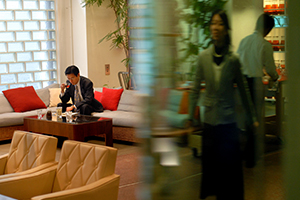 It seems like It seems like yesterday that environmentalism was a fringe issue, dismissed by some and comfortably ignored by many. Ideas of sustainability and conservation were considered the stuff of radicals and bohemians – stuck on the periphery outside the consciousness of the mainstream.
It seems like It seems like yesterday that environmentalism was a fringe issue, dismissed by some and comfortably ignored by many. Ideas of sustainability and conservation were considered the stuff of radicals and bohemians – stuck on the periphery outside the consciousness of the mainstream.
The ravaging effects of that inaction are starting to be felt, with unnerving statistics and freakish weather patterns leading to something of a call to arms against global warming. Even the early blooming of the cherry trees this year was blamed on climate change. (See complete list of things allegedly caused by global warming at www.spiked-online.com/index.php?/site/
article/2045/)
But on the positive side, if protecting the environment is a battle to be won through public relations, the efforts of eco-minded activists have been stunningly successful of late.
Green has become fashionable. Of course, having Leonardo DiCaprio in a Toyota Prius as a poster boy can’t hurt.
In Japan, consideration of eco issues has begun to seep into every level of society, from the government and major corporations right on down to enterprising organizations and individuals. Businesses are becoming increasingly concerned with green issues and any firm lacking an established environment policy is putting itself behind the proverbial 8-ball.
One company that clearly understands the need to go green is Aeon Co, the commercial developer behind such local outlets as Ministop and TAKA-Q. With Jusco, one of the nation’s leading supermarket chains, it distributes more than a billion plastic bags to customers each year. According to the Japan Polyolefin Film Industry Trade Association, the total number of bags consumed annually nationwide tops 30 billion.
Plastic bags present an environmental nightmare for numerous reasons. The amount of oil needed to produce so many bags is staggering, and it can take a long time for littered bags to break down naturally. When they do, they release toxic substances into the soil. Bags disposed at sea threaten wildlife and transport non-native organisms to other areas as they drift with the tides.
“They say 60 percent of global warming can be attributed to garbage,” says Kensaku Nishihara of the Aeon Group Public Relations Department. “Of that, 10-15 percent comes from plastic bags such as our shopping bags. We realized the best way for us to contribute to the environment was to decrease that number.”
Aeon and other stores have tried over the years to reduce the use of bags by offering discounts or other incentives to shoppers who bring their own reusable grocery sacks, dubbed eco bags. Nevertheless, any reduction achieved was minimal.
Spurred by the Government’s revised Containers and Packaging Recycling Law – which essentially mandates that retail stores find a way to slash their plastic consumption – what was once practically unthinkable became a reality.
Risking alienating customers who might have been less than eager to pay for what was once free, Aeon started charging エ5 per plastic bag at a Kyoto outlet on a trial basis. The results?
“Before the trial, only 22 percent of people brought their own eco bags [to the Kyoto store],” recalls Nishihara. “Now that number has increased to 80 percent. Of course it’s not perfect, but it’s as close to 100 percent as possible at this point. This just proves the support we enjoy from our customers.”
Aeon was so pleased that on April 5 it announced their intention to expand the pay-for-bags system.
“From this June, we will start it at one branch in Sendai and all branches in the city of Kyoto,” Nishihara says. Following that, “we plan to gradually bring the system to our stores in every prefecture in Japan, using the proceeds to fund recycling and other environmental projects.”
Simply Savvy
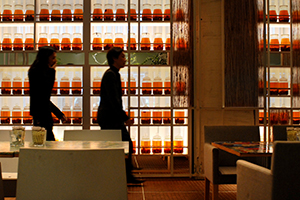 In business, it all comes down to basic dollars and cents. A monumental shift toward green awareness is underway, and with that comes altered consumer expectations that companies can’t afford to ignore.
In business, it all comes down to basic dollars and cents. A monumental shift toward green awareness is underway, and with that comes altered consumer expectations that companies can’t afford to ignore.
Kazumi Oguro serves as chairman of the board of directors for Japan’s leading LOHAS Club – LOHAS being an acronym for Lifestyles of Health and Sustainability. He’s also the chief editor of Sotokoto magazine – a bible of sorts for people interested in health- and environment-conscious living – with a circulation of about 100,000.
“To be considered ヤeco-friendly’ is a very attractive image for companies,” he says. “In this day and age, not only your products, but also your company’s attitude will be questioned. Look at the Fujiya scandal [in which the sweets maker was revealed to have used expired ingredients],” Oguro continues. “A firm’s moral values influence sales. Recently, an electric company revealed all kinds of inside information – much more than you’d expect them to.
“These things didn’t happen before. Society is changing.”
True enough, it’s not easy to find a major company on the planet that doesn’t list at least a few green schemes on its website – however effective or ineffective they may be.
Lingerie manufacturer Triumph International Japan, for one, is out to prove that protecting the environment can even be sexy.
Latching on to the imminent eco-bag craze, the company stripped down to reveal its No! Shopping Bag Bra late last year, continuing an established tradition of creating novel biosphere-friendly underwear.
When the bra – made from recycled fibers – is worn, the bag portions are tucked inside the cups. But in the few easy steps, it converts into a frilly shopping bag. Although to most people it might not seem the most practical idea, the company says the main point is to raise awareness about the importance of cutting down on plastic bags.
The previous winter, Triumph created a bra that can be heated as a promotion for the Koizumi-backed “Warm Biz” campaign to reduce heating use in offices.
Fast Retailing Co – known for its Uniqlo brand – is another garment company getting in on the recycling game.
After a well-received trial last September, the firm recently decided to offer a recycling service for every product sold in its stores, right down to the socks. Collection periods are held at all outlets twice a year – in March and September – after which the clothes are used in one of three ways. Clothes in good condition are donated to relief agencies and sent to developing countries. Articles not suitable for reuse are recycled into fiber for making insulation, work gloves and other industrial items. Finally, pieces inappropriate for either of those uses are turned into power-generating fuel.
“We don’t want to just sell clothes without thinking about what happens to them down the road,” Uniqlo spokeswoman Keiko Yamamoto said in a recent Associated Press report.
Uniqlo has also partnered with architect Tadao Ando and the Setouchi Olive Foundation to plant olive and other trees in the Seto Inland Sea region, restoring areas affected by illegal dumping.
A list of environmental enterprises could go on for pages. The success or failure of many corporate initiatives, however, depends a lot on the general public. Judging from the response, it appears people are ready to start taking better care of the earth.
“Human beings are still animals,” says Oguro. “Instinctively, I think they’re feeling their planet is in danger. People are getting more mature as species and that’s why they are making these efforts.”
A Little Creativity
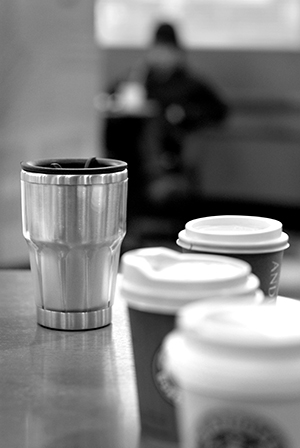 Positioned on the ground floor of an office building in one of Tokyo’s main central business areas, the Otemachi Cafe makes for a spectacular example of inventive recycling.
Positioned on the ground floor of an office building in one of Tokyo’s main central business areas, the Otemachi Cafe makes for a spectacular example of inventive recycling.
A product of Mitsubishi Estate Group, this oasis of negative ions is a testament to what can be accomplished with a touch of imagination.
“As we are involved in the business of urban development, we wondered what we could do to contribute to the environment,” explains Naka Inoue, a member of the Environment Unit of Mitsubishi’s City Development Project Team.
Early on a Thursday morning, Inoue sips coffee at one of the cafe’s secluded back tables. A fountain trickles in the background, nestled in the midst of greenery so lush it’s hard to imagine it’s in the middle of a financial district.
“We came to the conclusion we should make an example of resource circulation in society,” she says, describing an ideal world in which all possible materials are efficiently reused.
Fortunately, being eco doesn’t mean cutting corners on aesthetics. On the contrary, the Otemachi Cafe boasts a sublimely stylish and eclectic decor. It’s just that virtually every part of it originates from recycled material.
From tabletops of melted mobile-phone covers or tube-light glass and chairs formed out of wood from old Suntory whisky barrels, to floor tiles fashioned from dismantled building concrete, each item is unique.
It’s all about getting people to recognize what can be done with things that are usually discarded.”We thought if we made the eco aspect too ヤin your face’, we might limit the range of customers,” Inoue says. “We wanted to be accepted by as many people as possible, and in order to do that we put a lot of effort into designing a space that’s relaxing and enjoyable.”
Still, ecology plays a big part of the daily business.
Near the entrance is a large model of a sub-critical water disposal plant encased in glass, meant to demonstrate the process of transforming garbage into various resources through advanced hydrolysis reaction.
“Unfortunately it can’t be used here because of the noise and smell it would produce,” she says, “but we started this cafe just to show the possibilities.”
Frequent seminars on green lifestyles are also held, and various examples of urban gardening and agriculture are scattered throughout the cafe’s rooms.
“When we started, people who care about the environment spread the word and brought in customers,” Inoue says. It became a real community.
“If customers recognize our concept, we’re happy. We hope the Otemachi Cafe is an entrance for people on their journey toward environmental consciousness.”
Better Late…
So how did being green become cool, and where should we – those of us late to the party, at least – begin?
A strong influence behind the worldwide eco movement has been LOHAS, both a marketing notion and a rallying point for forming organizations. Its roots are in the United States but it has caught on like wildfire in Japan, boosted by luminaries such as renowned musician Ryuichi Sakamoto.
The acronym is meant to encompass a market segment of healthy living and environment-friendly consumerism said to be worth roughly $229 billion in the US alone. Socially responsible investing, recycling, energy conservation and natural food/medicine all fall under the conceptual umbrella of LOHAS.
“In the past we used terms such as ヤeco-friendly’ or ヤeco-lifestyles’,” says Oguro. “But the word ヤeco’ sounds like it’s only about saving – saving energy or money. I think a lot of people felt it wasn’t their style. Same for words such as ヤorganic’ or ヤnatural’.”
On the other hand, he says: “In one word, LOHAS grasps the broad concepts [of health and sustainability]. Plus, it just sounds more fun.”
On the organizational side of things, Oguro’s LOHAS Club issues a design award, certifies products, offers consulting services and hosts a variety of educational seminars. But despite the club’s influence on environmentalism in Japan, Oguro believes the forward movement we are witnessing today is just a logical progression.
“It was a matter of time,” he insists. “Even if we didn’t start this organization, people would be taking interest in these kinds of lifestyles. People were ready for it.”
Mitsubishi’s Inoue still remembers the time before green was groovy.
“I think a lot of people felt a bit embarrassed to do eco-related things,” she recalls.
Admittedly, carrying around a shopping bag was once the territory of elderly ladies – not exactly licensed as cool by the young and hip.
But now Inoue – a chic young woman in her own right – has her very own eco bag and she’s proud of it too.
From Swiss-made Freitag Bags to traditional Japanese furoshiki, “if you look around, there are plenty of cool designs and you can always find your own style,” she says.
Oguro sums up his suggestions for making a difference in two easy steps – steps that every one of us can follow with precious little effort. A reflex reaction might be to scoff and say the ideas are nothing new, but we can all use a reminder now and then.
“Step one: carry your own shopping bag, chopsticks, and bottle or thermos.
“Step two: tell all your friends about the satisfaction you gain from doing so.”
Sometimes it almost seems as if our planet is falling apart on a daily basis. Grim news reports make our prospects as a species look dark at best. But regardless, Inoue believes “if we take action now, we can still make it.”
Perhaps the outlook is brighter than we think? An idealist might even be inclined to believe that human beings are finally starting to figure out how to live in peace with their surroundings – that we’re actually evolving in the right direction.
We’re not out of the woods yet, not by a long stretch. But if we can work harder to incorporate the three ヤR’s – reduce, re-use and recycle – into our daily lives, maybe, just maybe, our future will indeed be green.
Story by Jim Hand-Cukierman
From J SELECT Magazine, June 2007

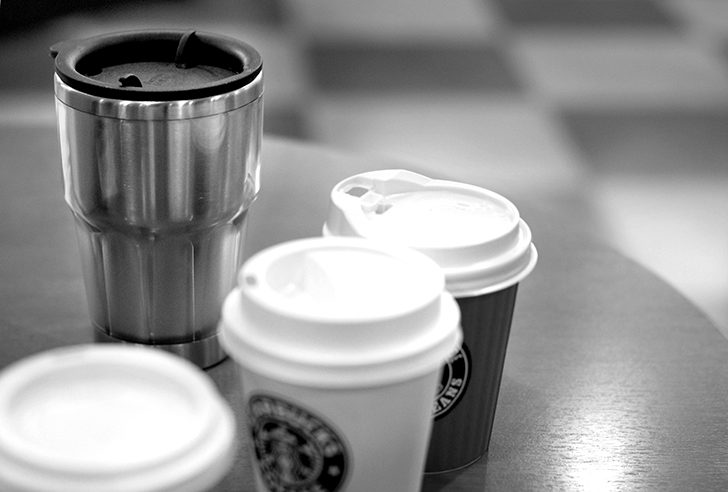







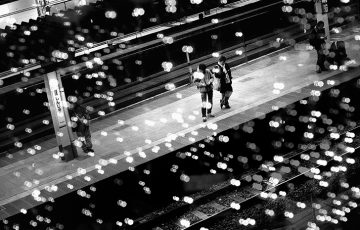
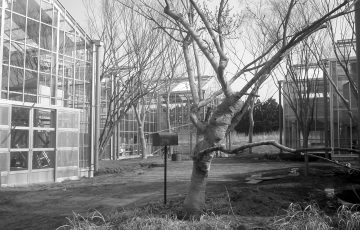

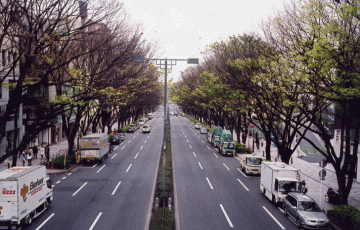


Recent Comments